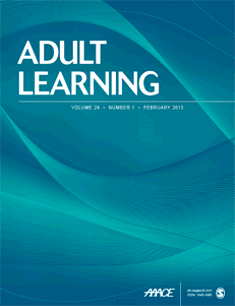
Adult Learning
Scope & Guideline
Unlocking Potential Through Knowledge.
Introduction
Aims and Scopes
- Lifelong Learning and Professional Development:
The journal emphasizes the importance of lifelong learning, exploring innovative approaches and frameworks for adult education, including professional development in various sectors such as healthcare, community services, and corporate environments. - Social Justice and Equity in Education:
A core area of focus is on promoting social justice and equity, particularly through research that addresses the needs of marginalized and underrepresented groups, including immigrants, refugees, and women. - Digital Literacy and Technology Integration:
The integration of technology in adult learning environments is a significant theme, with studies exploring the role of digital literacy, online learning platforms, and emerging tools like gamification and AI in enhancing educational experiences. - Community Engagement and Development:
Research often investigates the relationship between adult education and community development, looking at how education can empower individuals and foster active citizenship within communities. - Cultural and Contextual Considerations:
The journal recognizes the diverse cultural contexts of adult learners, emphasizing research that considers the sociocultural dynamics influencing learning processes and outcomes.
Trending and Emerging
- Gamification and Innovative Learning Strategies:
The use of gamification as an educational tool is gaining traction, as research highlights its effectiveness in engaging adult learners and enhancing motivation, particularly in areas like retirement planning and professional development. - Digital Transformation and Learning Technologies:
As digital technologies continue to evolve, there is an increasing emphasis on understanding their impact on adult learning, with studies focusing on digital literacy, online learning platforms, and the role of AI in facilitating self-directed learning. - Community Resilience and Active Citizenship:
Research is increasingly exploring the intersection of adult education with community resilience and active citizenship, particularly in response to global challenges such as climate change, social equity, and political engagement. - Mental Health and Emotional Well-being in Learning:
There is a growing focus on the mental health aspects of adult learning, with studies investigating the emotional dimensions of learning experiences and the importance of creating supportive educational environments. - Intercultural Learning and Global Perspectives:
The emphasis on intercultural effectiveness and global learning is rising, as adult education seeks to prepare learners for participation in an increasingly interconnected world.
Declining or Waning
- Traditional Classroom-Based Learning:
There is a noticeable decline in research centered on traditional classroom-based learning models, as the focus shifts towards more flexible and innovative approaches that cater to adult learners' varied needs. - Narrowly Defined Demographic Studies:
Research that narrowly targets specific demographic groups without considering broader social contexts is becoming less common, as there is a growing recognition of the need for intersectional and inclusive studies. - Standardized Assessment Practices:
The focus on standardized assessments and evaluation methods has diminished, reflecting a shift towards more holistic and formative assessment strategies that better capture adult learners' growth and development.
Similar Journals

INTERNATIONAL REVIEW OF EDUCATION
Pioneering Interdisciplinary Insights in EducationINTERNATIONAL REVIEW OF EDUCATION is a premier academic journal published by SpringerNature, recognized for its substantial contributions to the field of education since 1955. With an ISSN of 0020-8566 and an E-ISSN of 1573-0638, it has established itself as an essential platform for interdisciplinary research and discourse. The journal boasts an impressive Q1 ranking in Education and a Q2 ranking in E-learning for 2023, positioning it among the top tier of scholarly publications. According to Scopus, it ranks #224 out of 1543 in the Social Sciences - Education category, corresponding to the 85th percentile, reflecting its influence and relevance in the academic community. The INTERNATIONAL REVIEW OF EDUCATION seeks to advance understanding in both theoretical and practical aspects of education, making it a vital resource for researchers, educators, and policymakers alike. Access to its comprehensive studies and reviews facilitates the continuous development of innovative educational practices, ensuring relevance in a rapidly changing global landscape.

Educacion XX1
Unlocking Potential: Navigating the Evolving Landscape of EducationEducacion XX1 is a premier academic journal dedicated to the field of education, published by UNIV NACIONAL EDUCACION DISTANCIA in Spain. With an impressive impact factor and recognition in the Q1 category for 2023 in education, this open-access journal has served as a significant platform for innovative research since 2000. The journal aims to share high-quality empirical studies, theoretical discussions, and reviews that address contemporary educational challenges, promoting a deeper understanding of pedagogical practices and policies. As evidenced by its Scopus ranking of #122/1543 in Social Sciences - Education, along with a notable percentile of 92, Educacion XX1 continues to contribute to the scholarly community while fostering global discourse and collaboration. With a diverse range of articles covering various topics and perspectives, this journal is invaluable for researchers, professionals, and students alike, providing insights essential to advancing education in today’s rapidly evolving landscape.
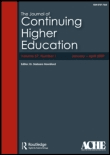
Journal of Continuing Higher Education
Transforming Adult Education Through Insightful ResearchThe Journal of Continuing Higher Education is a premier publication dedicated to advancing the dialogue around adult learning, professional development, and transformative educational practices in higher education. Published by Routledge Journals, Taylor & Francis Ltd, this journal is recognized for its rigorous research articles and insightful reviews, guiding educators and practitioners in enhancing lifelong learning. With a notable impact factor and a Q2 ranking in Education as of 2023, it plays a pivotal role in shaping policies and practices in the field. The journal embraces a broad scope, encompassing various aspects of continuing higher education from theory to application, and is committed to fostering innovative approaches that respond to the evolving needs of adult learners. Accessible to professionals, researchers, and students alike, the Journal of Continuing Higher Education serves as an invaluable resource for those dedicated to improving educational outcomes for non-traditional students, ensuring that the knowledge shared therein remains relevant and impactful.

South African Journal of Higher Education
Catalyzing educational reforms with scholarly excellence.South African Journal of Higher Education, published by SUNJOURNALS, is a leading peer-reviewed platform dedicated to advancing scholarship in the field of higher education. As an Open Access journal since 2016, it ensures that research findings are freely accessible to a global audience, fostering collaboration and innovation among researchers, educators, and policymakers. With the ISSN 1011-3487 and E-ISSN 1753-5913, this journal aims to disseminate high-quality research that addresses current challenges and trends in higher education within South Africa and beyond. The journal's commitment to scholarly excellence enhances its importance in contributing to impactful educational practices and reforms. By providing a platform for contemporary academic discourse, it serves as a vital resource for professionals in the field, facilitating the exchange of ideas that can shape the future of higher education. For researchers, this journal is an invaluable tool for staying abreast of the latest studies, methodologies, and theoretical frameworks.
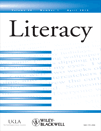
Literacy
Connecting Researchers and Educators in Literacy AdvancementLiteracy is a premier academic journal published by Wiley, focusing on critical advancements and research in the fields of education and linguistics. With an impressive impact factor reflected in its Q2 ranking in Education and Q1 in Linguistics and Language, this journal serves as a vital platform for researchers, educators, and students seeking to explore contemporary issues surrounding literacy in diverse contexts. Since its inception in 2005, Literacy has made significant contributions to understanding the evolving nature of literacy practices, promoting dialogue on innovative pedagogies and the sociocultural implications of language use. While it is not an Open Access journal, its accessibility through institutional subscriptions ensures that its valuable insights reach a broad audience. With its robust Scopus rankings, including an 88th percentile in Language and Linguistics and 63rd in Education, Literacy remains an indispensable resource for those committed to advancing literacy education and research.
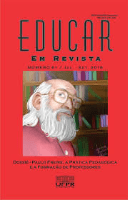
Educar em Revista
Unlocking the potential of education through research.Educar em Revista is a leading academic journal dedicated to the field of education, published by EDITORA UNIV FEDERAL PARANA, CENTRO POLITECNICO. With an ISSN of 0104-4060 and E-ISSN 1984-0411, this prestigious journal has been an Open Access platform since 2006, ensuring that its valuable research is accessible to a global audience. Situated in the vibrant city of Curitiba, Paraná, Brazil, it aims to promote critical discussions and innovative research in educational practices, theories, and policies. As an essential resource for researchers, professionals, and students alike, Educar em Revista strives to contribute to the advancement of education by disseminating high-quality articles that explore contemporary issues and emerging trends in the field. Its commitment to open access enhances its reach and impact, making it a pivotal resource for those dedicated to driving educational change and improvement.

Canadian Journal for the Study of Adult Education
Bridging Theory and Practice in Adult Education.Canadian Journal for the Study of Adult Education, published by UNIV CALGARY PRESS, is a vital resource for scholars and practitioners in the field of adult education. With its ISSN 0835-4944 and E-ISSN 1925-993X, this journal aims to contribute significantly to the discourse surrounding lifelong learning, adult educational practices, and the challenges faced by adult learners in diverse contexts. Although currently not available as an Open Access publication, it continues to play a crucial role in disseminating quality research and innovative practices that shape educational policy and practice in Canada and beyond. The journal frequently features peer-reviewed articles, critical essays, and research reports that support the professional growth of educators, researchers, and policymakers. By bridging theory and practice, the Canadian Journal for the Study of Adult Education stands as an essential platform for fostering dialogue and collaboration within the adult education community.

Cambridge Journal of Education
Shaping the future of education through scholarly excellence.The Cambridge Journal of Education, published by Routledge Journals, Taylor & Francis Ltd, stands as a pivotal platform for scholarly discourse in the field of Education. With a distinguished history spanning from 1971 to 2024, this journal encompasses a diverse array of educational research, ranging from policy analysis to pedagogical innovations. Notably, it enjoys a prominent Q1 status in the Education category, reflecting its high impact and prestige within the academic community, as evidenced by its ranking of #251 out of 1543 in Social Sciences Education on Scopus, placing it in the 83rd percentile. Although access is not open, the journal offers valuable insights and empirical studies that aim to inform educators, researchers, and policymakers alike. With an ISSN of 0305-764X and E-ISSN of 1469-3577, the Cambridge Journal of Education is an essential resource for those committed to advancing the understanding and practice of education globally.
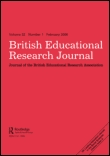
BRITISH EDUCATIONAL RESEARCH JOURNAL
Exploring Diverse Themes in Education for Lasting ImpactBritish Educational Research Journal, published by Wiley, stands as a pivotal platform in the field of education research, fostering significant scholarly dialogue since its inception in 1978. With an ISSN of 0141-1926 and E-ISSN of 1469-3518, this journal is recognized for its rigorous peer-reviewed articles that contribute to understanding educational practices and policies, thus holding a prominent position in the Q1 category of education journals as rated in 2023. It ranks #298 out of 1543 in the Scopus database, showcasing its influence and relevance in the educational sphere, reflected in its 80th percentile ranking. The journal's scope encompasses diverse educational themes, making it an essential resource for researchers, practitioners, and students alike. Although it does not offer open access, its comprehensive studies and insightful analyses contribute significantly to the advancement of educational theory and practice, supporting informed decision-making in educational contexts.
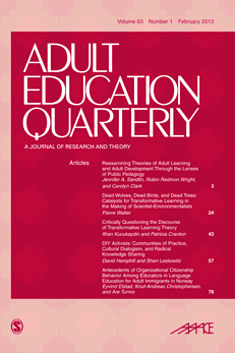
ADULT EDUCATION QUARTERLY
Navigating the Landscape of Lifelong LearningADULT EDUCATION QUARTERLY, published by SAGE PUBLICATIONS INC, stands as a premier scholarly outlet in the field of adult education and lifelong learning, with a distinguished history dating back to 1950. Holding a notable Q2 ranking in both Education and E-learning categories as of 2023, this journal serves as a vital resource for researchers and practitioners alike, offering deep insights into contemporary issues, theoretical frameworks, and empirical studies related to adult learning. The journal's impressive Scopus ranking places it in the 67th percentile of Social Sciences Education, reflecting its impact and relevance within the academic community. Although not an open-access journal, ADULT EDUCATION QUARTERLY ensures that it maintains high academic standards and contributes to meaningful discourse in the field. With a commitment to fostering a better understanding of adult education practices and promoting innovative learning models, this journal plays a critical role in advancing knowledge and shaping the future of education for adults globally.